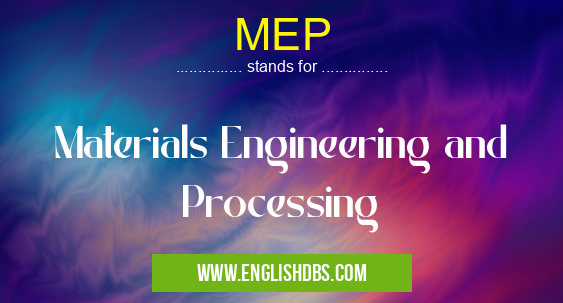What does MEP mean in ENGINEERING
Materials Engineering and Processing (MEP) is the application of science and engineering principles to the extraction, processing, and development of materials in order to improve performance, properties, and functionality. It involves creating new or improved materials by changing their chemical or physical structure at a molecular level. The end goal is often a material that has superior physical, chemical or electrical properties. Materials Engineering and Processing can range from developing new industrial processes to designing advanced nano-structures for enhanced performance.

MEP meaning in Engineering in Academic & Science
MEP mostly used in an acronym Engineering in Category Academic & Science that means Materials Engineering and Processing
Shorthand: MEP,
Full Form: Materials Engineering and Processing
For more information of "Materials Engineering and Processing", see the section below.
What Does MEP Stand For?
MEP stands for Materials Engineering and Processing. This field focuses on the study of how to manipulate materials at a molecular level to alter their physical or chemical properties in order to optimize them for specific applications. This may include creating new materials through synthesis or altering existing ones through post-processing techniques such as coating or ion implanting.
What Are Its Applications?
The applications of MEP are broad and diverse. In industry it is used to develop components such as engine parts made from metal alloys with specific strength-to-weight ratios for improved efficiency; biomedical implants made from biocompatible materials with improved durability; flexible electronic components made from conductive polymers for use in wearable devices; optical coatings designed to reduce glare on eyeglasses; nanomaterials used in quantum computing; catalysts used in fuel cells; high temperature insulation material for aerospace use; new drug delivery systems designed for more effective treatments and more.
Essential Questions and Answers on Materials Engineering and Processing in "SCIENCE»ENGINEERING"
What is Materials Engineering and Processing?
Materials Engineering and Processing is a field that focuses on the design, development, and production of materials for use in various industries. It involves the application of principles from chemistry, physics, engineering, and materials science to create new materials or improve existing ones. The aim of this branch of engineering is to develop materials that are both practical and efficient for their intended use.
What techniques are used in Materials Engineering and Processing?
Techniques used in Materials Engineering and Processing include alloying, heat treatment, surface treatments, machining processes such as cutting or grinding, composite manufacturing methods such as injection molding or extrusion, 3D printing technologies, coatings/surface treatments such as galvanizing or electroplating, analytical techniques such as imaging studies or electron microscopy to study material properties.
What are the benefits of Materials Engineering and Processing?
Benefits of Materials Engineering and Processing include improved performance characteristics of materials such as strength or durability; reduced costs associated with producing a given product; greater reliability due to better quality control; faster production process due to improved understanding of material behavior; increased safety due to better understanding of potential risks associated with specific material applications; increased efficiency due to optimization techniques applied throughout the entire design-to-production process.
How does Materials Engineering and Processing differ from other branches of engineering?
Compared to other branches of engineering like mechanical engineering or electrical engineering, Materials Engineering and Processing is more specialized since it focuses solely on working with materials. It requires an understanding not only of the physical properties but also the chemical properties that may affect how a material will perform when used in a certain application. This knowledge allows engineers to select the best possible material for a particular application while minimizing risk associated with untested material combinations.
What kind of jobs can I find within Materials Engineering and Processing?
Jobs within Materials Engineering and Processes typically involve either research & development (R&D) activities or production/manufacturing tasks related to creating new products utilizing existing materials/processes or developing innovative solutions using different types of material combinations. Specific positions include process engineers performing quality control tasks related to production lines; R&D scientists creating new formulations for improved product performance; chemical engineers optimizing raw-material utilization strategies; etc.
What kind of educational background do I need for a career in Materials Engineering and Processing?
Most employers will require at least a bachelor's degree in materials science or engineering related field along with some experience in industrial processes relevant to their position when considering candidates for roles related to Material Science & Processes. As research projects often require advanced specialization knowledge gained through postgraduate education may be beneficial depending on job requirements.
Final Words:
Materials Engineering and Processing represents an exciting interdisciplinary field, encompassing everything from basic research on materials structure down to their real world applications. By understanding the fundamentals of this science – including how different elements interact when combined together – engineers are able to design solutions tailored specifically for their project needs, yielding higher performing products that are more reliable, safe, energy efficient and cost effective.
MEP also stands for: |
|
| All stands for MEP |
